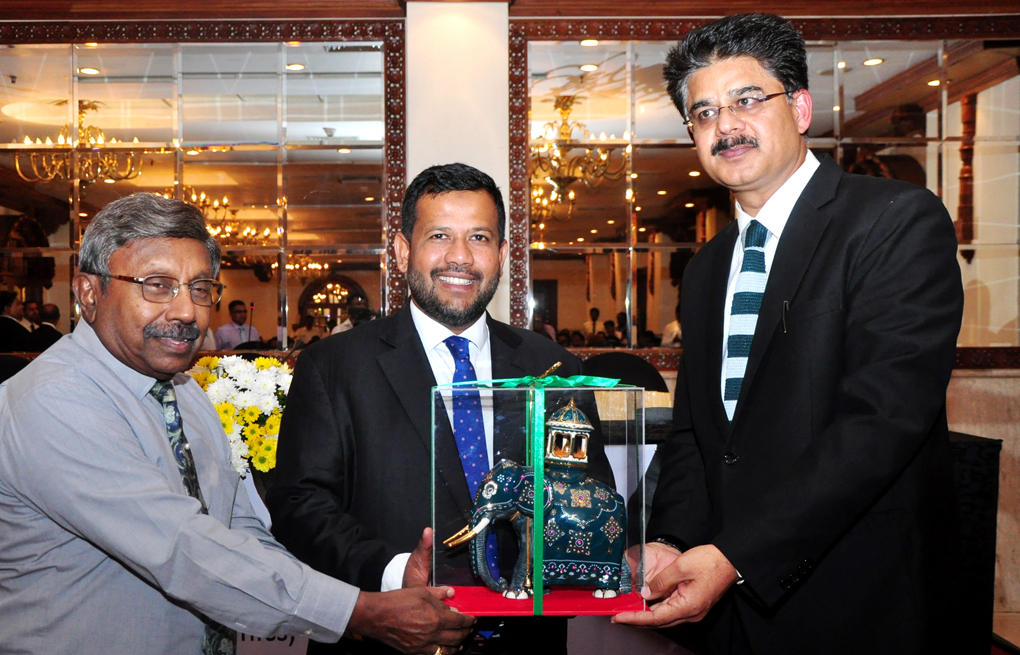
Sri Lanka has begun boosting its world class porcelain, glass and red-clay industry segments with a host of new initiatives -and has also realised that the red-clay sector that is now surging as a result of next year’s Asbestos ban, packs considerable promise for the economy.
“Sri Lanka’s clay and quartz are of high quality and our ceramic and glass products are not damaged easily” said the Minister of Industry and Commerce Rishad Bathiudeen on 15 September in Colombo. Minister Bathiudeen was addressing the 14th AGM of Sri Lanka Ceramics and Glass Council on 15 September at Kingsbury Hotel, Colombo. Joining the event were Managing Director & CEO of Piramal Glass Ceylon PLC and President of the Sri Lanka Ceramic & Glass Council (SLCGC) Sanjay Tiwari and nearly 100 reps from the ceramics, glass and red-clay industries of Sri Lanka.
“Though the total ceramics and glass exports last year showed a decline to $ 50 million from 2015’s $61 Million it looks to be temporary since this is the first time we see a decline after years. In that this industry continuously has been showing a positive performance. The reason is well known-Sri Lanka’s clay and quartz are of high quality and our ceramic and glass products are not damaged easily and the industry too has a long history” said Minister Bathiudeen and added: “Therefore our products are very competitive in global markets. To sustain competitiveness we need to keep our production costs low. In 2011 we submitted a Cabinet Paper to reduce prices of fuel given to ceramics and glass industry but it was not successful. Despite this we have not given up. I assure you, that we are still continuing to look for a solutions and have instructed my officials to work on this and to continue discussions with Petroleum Ministry and other fuel vendors to seek low cost fuels. We completed surveys to find clay and other mineral deposits in the Western and Central Province and the surveys were successful. We are also working to develop our red clay industry. Our clay is high quality and is in demand for roof tile making due to the Asbestos imports ban starting next year. We also assisted SLS certification program to create a good image of local red clay industry. With the support of National Engineering Research and Development (NERD) Centre we set up Sri Lanka’s first roof tile drying centre in Dankotuwa. We sent 30 Lankan red clay industrialists for technological training to Belgium and China.”
Unlike many other ceramics and porcelains produced elsewhere in the world, Sri Lankan made porcelain are considered world class -well within lead and cadmium release standards of FDA of USA, with ISO 9001:2000 certifications, and microwave/oven/washing machine resistant. Sri Lankan industry even produces the “bone china” tableware –considered as the most expensive ceramics in the world; Sri Lanka’s premium ceramic outputs are coveted by many globally reputed brands, among them are Royal Doulton, John Lewis, Debenhams, Marks & Spencer, Waitrose, Walmart, and Macy’s. Among the globally-known and long established Sri Lankan porcelain brands are Noritake Lanka (tableware), Midaya (handmades & ornamantalware), Dankotuwa (porcelain tableware). Noritake Lanka Porcelain (Private) Ltd is in fact the Sri Lankan operation (consolidated subsidiary) of Nagoya Japan headquartered world’s number one tableware maker, Noritake Co. Ltd.
“We acknowledge that the successes of our industry were possible due to the collective efforts of the Council Board members and the support of Minister Bathiudeen and the Ministry of Industry and Commerce and other government institutions” said SLCGC’s President Tiwari and added: “We recommended introducing global criteria of fixing the fuel prices based on a formula that is linked to world crude oil prices to bring in more transparency and for a level playing field in the industry. In spite of the challenges we face, we have been investing in capacity building and innovation. Also mining of local raw materials such as silica sand, research & development on clay tile to control the weight of the tile were completed. Discussions on anti-dumping policy in the country is essential – Unnecessary competition from low quality imports due to unavailability of anti-dumping policy in Sri Lanka is hampering us and it is time the policy is introduced here. During the year we also organized familiarization tour of Europe for our Red Clay Industry with the help of Ministry of Industry and Commerce and we thank the Ministry of Industry and Commerce for this timely work.”
In September 2016, on a proposal by HE President Maithripala Sirisena, Sri Lanka announced it was banning the importation of Asbestos from 2018, spurring a new wave of red-clay roof tile production in the country, a part of which is now successfully exported to UK as well –and the exporters saying they are unable to meet the demand. Sri Lanka’s ceramic and glass industries employ a workforce of around 55000.


